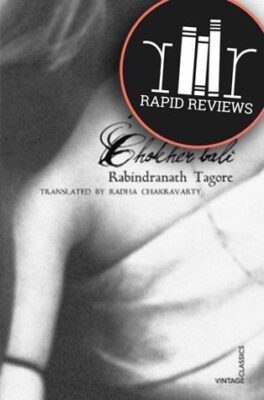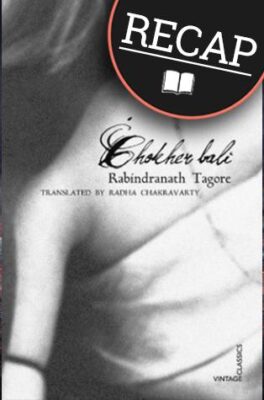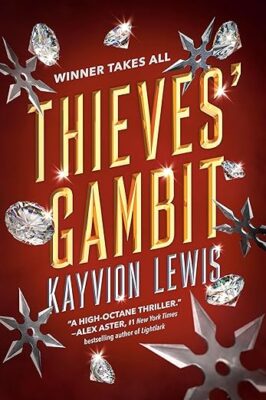No spoilers in this review of Chokher Bali by Rabindranath Tagore.
Special thanks to Sarina Byron, a BSR contributor who wrote this great review! Sarina is a British Author and Contributing Writer living in California. Sarina enjoys bringing forth a different perspective and encouraging a different way of thinking through her writing. Visit her blog to read her reviews, and check the end of the review for a link to her Instagram.
“Love is a commodity that I had not been showered with in my life, so why should I deny any offer of love?”
This one sentence would assuage the entire review so well that I needn’t write a word more. That Tagore’s women’s comportment and choices were ahead of their times is a statement oft repeated and inordinately obvious in Chokher Bali, too. The brilliance of Chokher Bali stems from the fact that it is Tagore’s first full length novel. He was by no means a new author, being renowned for his short stories. No matter how brilliant an author may be, however, creating Chokher Bali in your first attempt at a novel is no small matter.
An extra marital affair looms large in the story, and an amateur summary of the book would use that theme as being central to it. In my opinion, however, it is all a matter of desires: Rajlakshmi’s desire to remain the only woman of concern to her son. Ashalatha’s desire to make a place for herself in her in-laws house. Binodini’s desire to be loved. Bihari’s desire to do his best for Rajlakshmi and Mahendra in return for their love. And Annapurna’s centra desire being that everyone she loves be happy. These desires gave birth to the whole saga. Desire has the power to impudently lead man towards success or ruin, the only thing standing between desire and the result is the insight which only Binodini possessed.
Transfixed by Mahendra’s letters detailing his amorous life with Ashalatha, Binodini went so far as to devise a ruse to claim that love for herself. She had the insight to realise that a love devoid of the mundane realities of life would fizzle out, that the charms of a partner, no matter how beguiling, pale when combined with a lack of education and ineptness at the proficiencies of life. Who could imagine that one’s capabilities would be instrumental in bringing ruination amongst those one grows to love? Binodini grew to love all those she was manipulating. But she had been devoid of love for so long that she didn’t know how not to twist it to her motivations.
Chokher Bali means a mote in the eye in Bengali, the language this book was originally written in. Once read, it truly sticks like that. The way we look at everything changes, and if it doesn’t change for you, think again, my dear. Look up from the screen once in a while and really look at your partner. Is something unsaid gradually dimming the sparkle from their eyes? Without flattering yourself, look at your friends. Are they in your life for you or because something about you makes them feel superior? The alternate perspective to relationships within Chokher Bali is just one facet of the book that makes it remarkable. It may feel rancorous at the start, but you mustn’t take umbrage, for this is wisdom: knowing that everyone is tethered to each other with love but also a bit of resentment.
What makes the novel unforgettable, though, is that it lays bare human emotions in the rawest form. Chokher Bali says things we don’t say, thinks things we are too scared to acknowledge, and enacts situations we have only ever fantasised about. It burgeoningly sanctifies the incongruous. Whilst translating this masterpiece, Sukhendu Ray said that translations seem like an effrontery. In this case, this is true of the text and the story itself. It is an effrontery to a society that prides itself in perfection of structural propriety.
Mahendra embodies perhaps all of society when he consoles himself by wondering why his wife should be upset if he was embroiled in a passionate play with her best friend. He equally considered himself the best moral guardian to Binodini. He—who had left home to live and travel around the country with his wife’s widowed best friend—found himself on superior moral ground to Bihari, who had sacrificed many a precious desire on Mahendra’s whims.
Mahendra’s mother perhaps represents the ugly underbelly of the same perfectionist society that gives us the moral turpitude to destroy someone’s happiness so we can feel better. Rajlakshmi did exactly that by exalting Binodini’s virtues to subdue Asha only because Asha seemed to have turned Mahendra uxorious.
Whether any of them were right or not in their comportment towards each other is a matter for you to decide. But all I can say is that once you embark on the journey of these 298 pages, you will never be the same. And perhaps that’s really for the best.
Let us know what you think about this review of Chokher Bali and Sarina’s great review in the comments! No spoilers on this page, please!
Ready to read Chokher Bali? Click to buy and help us pay for hosting.

What now?
Don’t forget to check out Sarina’s blog, and you can follow her on Instagram!
Follow Book Series Recaps on Instagram, Pinterest, and Twitter.
Friend us on Goodreads: Sara and Stacy.
Oh and share this review of Chokher Bali with your friends who might like this book!






















